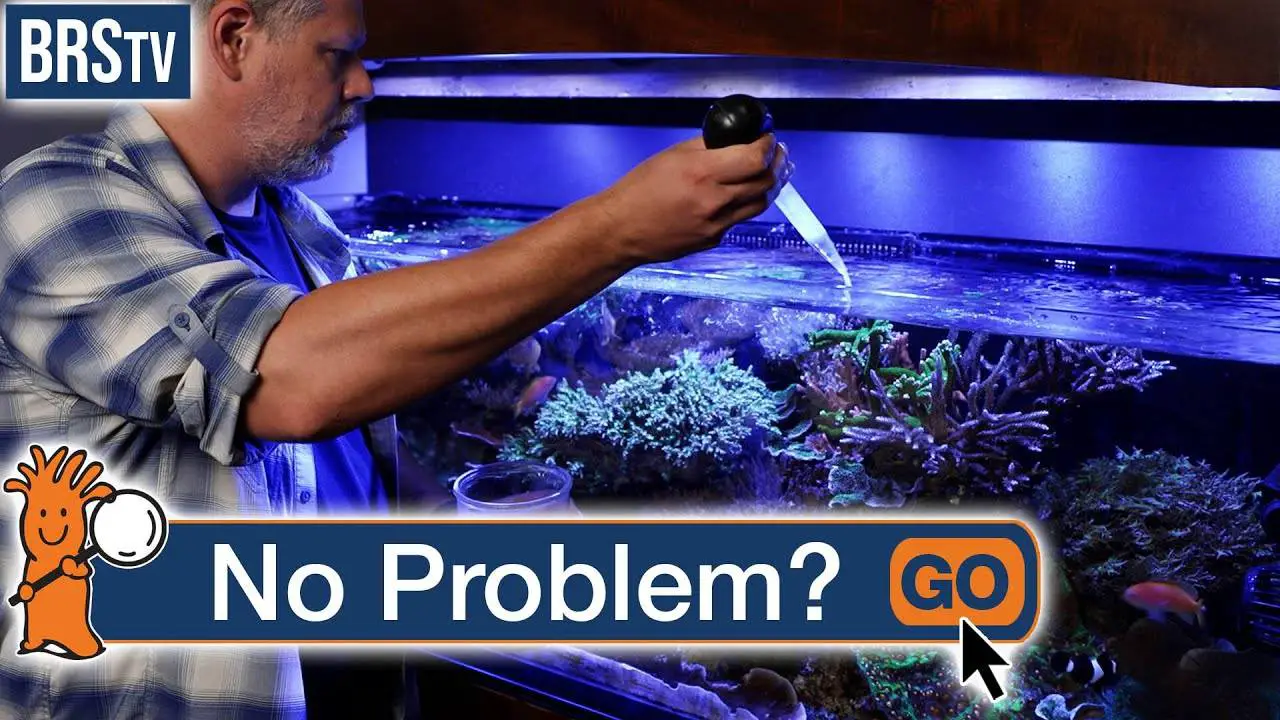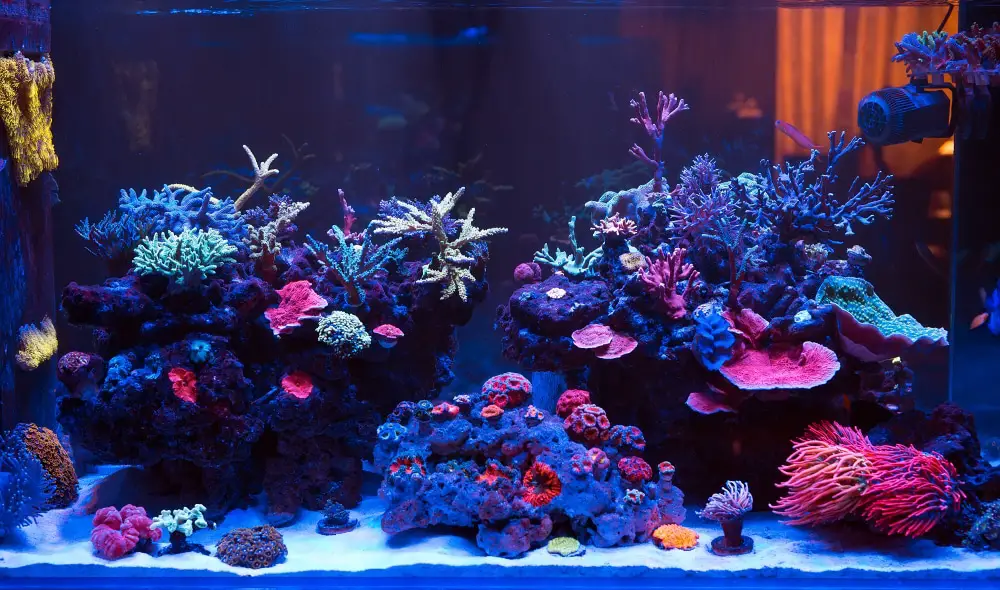Saltwater aquariums are a beautiful addition to any home or office, but many people are hesitant to take on the responsibility of maintaining them. The question on everyone’s mind is: is a saltwater aquarium hard to maintain? The short answer is yes, but with a little bit of knowledge and effort, anyone can successfully care for a thriving saltwater aquarium.
One of the main factors that make saltwater aquariums more challenging to maintain than freshwater aquariums is the delicate balance of water chemistry. However, by understanding the basics of water quality, filtration, and nutrition, you can create a healthy environment for your marine pets. So, let’s dive into the world of saltwater aquariums and discover what it takes to keep them flourishing.
Maintaining a saltwater aquarium can be challenging and requires a lot of effort. You need to monitor the water conditions regularly, perform regular water changes, and provide appropriate lighting and temperature for the fish and other marine creatures. Additionally, you need to ensure that you are feeding them the right kind and amount of food and cleaning the tank regularly. However, with the right knowledge and dedication, it can be a rewarding experience.

Is a Saltwater Aquarium Hard to Maintain?
Saltwater aquariums are becoming increasingly popular among hobbyists due to their beauty and the wide variety of marine life they can house. However, many people hesitate to start a saltwater aquarium because of the perceived difficulty in maintaining one. In this article, we will explore the question of whether a saltwater aquarium is hard to maintain and provide some tips for success.
Water Quality
Maintaining water quality is one of the most important aspects of keeping a saltwater aquarium. Unlike freshwater aquariums, saltwater aquariums require a more precise balance of chemicals and minerals in the water. This can be achieved through regular water changes, testing the water frequently, and using high-quality filtration equipment.
One of the best ways to maintain water quality is to invest in a protein skimmer. A protein skimmer removes organic waste from the water before it has a chance to break down and negatively impact water quality. Additionally, using live rock and sand in the aquarium can help to reduce the levels of nitrates, nitrites, and ammonia in the water.
Equipment
Maintaining a saltwater aquarium requires some specialized equipment that can be expensive. However, investing in high-quality equipment can make a big difference in the success of your aquarium. Some essential equipment includes a heater, chiller, lighting, filtration system, and a protein skimmer.
It is important to research the different types of equipment available and choose equipment that is appropriate for the size and type of your aquarium. Additionally, regular maintenance of equipment is necessary to ensure it is functioning properly and efficiently.
Marine Life
One of the biggest draws of a saltwater aquarium is the ability to keep a wide variety of marine life. However, it is important to choose fish and other marine creatures that are appropriate for your aquarium and compatible with each other. Some fish and invertebrates can be aggressive and territorial, which can lead to fights and stress for other inhabitants of the tank.
It is also important to research the care requirements for each species and ensure that they are compatible with your level of experience. Some marine creatures can be more difficult to care for than others, so it is important to choose species that you are prepared to care for properly.
Time Commitment
Maintaining a saltwater aquarium does require a significant time commitment. Regular testing of the water, water changes, and equipment maintenance are all necessary to ensure a healthy and thriving aquarium. Additionally, feeding and caring for the marine life in the aquarium can be time-consuming.
However, with proper planning and organization, it is possible to reduce the time commitment required. For example, using an automatic feeder can help to ensure that fish are fed on a regular schedule and reduce the need for daily feeding.
Cost
Maintaining a saltwater aquarium can be expensive, especially when it comes to equipment and marine life. However, there are ways to reduce costs without sacrificing the health and success of the aquarium. For example, purchasing used equipment or buying in bulk can help to reduce costs.
Additionally, it is important to research the care requirements for each species of marine life and choose species that are appropriate for your budget. Some species can be more expensive to care for than others, so it is important to choose wisely.
Benefits
Despite the challenges of maintaining a saltwater aquarium, there are many benefits to having one. Saltwater aquariums are incredibly beautiful and can provide hours of entertainment and relaxation. Additionally, caring for a living ecosystem can be rewarding and fulfilling.
Saltwater aquariums also provide an opportunity to learn about marine life and their habitats. Many hobbyists become passionate about marine conservation and take steps to protect and preserve marine ecosystems.
Saltwater vs. Freshwater
One common question among aquarium hobbyists is whether a saltwater aquarium is harder to maintain than a freshwater aquarium. While both types of aquariums require regular maintenance and upkeep, saltwater aquariums do require more specialized equipment and a more precise balance of chemicals in the water.
Additionally, marine life can be more sensitive to changes in water quality and other environmental factors, so extra care and attention is required. However, with proper research, planning, and care, both saltwater and freshwater aquariums can be successful and rewarding.
Tips for Success
Maintaining a saltwater aquarium requires dedication and attention to detail. Here are some tips for success:
- Invest in high-quality equipment
- Research the care requirements for each species of marine life
- Test the water frequently and perform regular water changes
- Use a protein skimmer to maintain water quality
- Choose appropriate species of marine life that are compatible with each other
- Feed the marine life on a regular schedule
- Maintain equipment regularly
- Monitor the temperature and ensure it remains stable
- Be patient and prepared to put in the time and effort required for success
Conclusion
Maintaining a saltwater aquarium can be challenging, but with proper planning and care, it can also be incredibly rewarding. By investing in high-quality equipment, choosing appropriate species of marine life, and maintaining water quality and equipment regularly, it is possible to create a thriving and beautiful saltwater aquarium.
Frequently Asked Questions
Is a Saltwater Aquarium Hard to Maintain?
Maintaining a saltwater aquarium can be challenging, but it doesn’t have to be difficult. The key to success is to establish a routine and stick to it. This means testing the water regularly, performing regular water changes, and keeping up with basic maintenance tasks like cleaning the glass and changing the filter media.
One of the biggest challenges with saltwater aquariums is maintaining water quality. This requires careful attention to detail and a good understanding of the nitrogen cycle. You’ll need to test the water regularly to monitor levels of ammonia, nitrite, and nitrate, and take appropriate action if any of these levels get too high. With a little bit of knowledge and dedication, anyone can successfully maintain a saltwater aquarium.
What Equipment Do I Need for a Saltwater Aquarium?
To set up a saltwater aquarium, you will need a few basic pieces of equipment. This includes a tank, a filtration system, a heater, a thermometer, and a protein skimmer. You may also want to consider adding a powerhead or two to improve water circulation and a lighting system to support the growth of live plants and corals.
It’s important to choose high-quality equipment that is appropriate for the size of your aquarium. Investing in good equipment upfront will make it easier to maintain a healthy and thriving saltwater aquarium over the long term.
How Often Do I Need to Test the Water in a Saltwater Aquarium?
Testing the water in a saltwater aquarium is an essential part of maintaining a healthy and thriving ecosystem. It’s recommended to test the water at least once a week for ammonia, nitrite, and nitrate levels. You may also want to test for other parameters like pH, alkalinity, and calcium to ensure that the water is within the appropriate range for your livestock.
If you’re just starting out with a new aquarium, you may need to test the water more frequently until the nitrogen cycle is established. Once the tank is mature, you can reduce the frequency of testing to once a week or even once every other week.
Can I Keep Corals in a Saltwater Aquarium?
Yes, you can keep corals in a saltwater aquarium. In fact, many hobbyists enjoy creating beautiful and diverse coral reefs in their tanks. However, keeping corals requires a bit more knowledge and effort than keeping fish.
Corals require specific water conditions, including appropriate levels of calcium, alkalinity, and pH. They also require appropriate lighting and water flow. You’ll need to invest in a good lighting system and make sure to provide adequate water movement to keep the corals healthy.
What Are Some Common Mistakes to Avoid When Maintaining a Saltwater Aquarium?
Maintaining a saltwater aquarium can be challenging, and there are several common mistakes that novice hobbyists often make. One of the biggest mistakes is overfeeding the fish, which can lead to poor water quality and health issues for the fish.
Another common mistake is neglecting to perform regular water changes. It’s important to change out a portion of the water every two to four weeks to remove accumulated waste and replenish essential minerals.
Finally, many hobbyists make the mistake of adding too many fish or corals too quickly. It’s important to start slowly and allow the tank to establish a healthy ecosystem before adding new livestock.

Is a Saltwater Fish Tank Hard to Maintain?
In conclusion, maintaining a saltwater aquarium can be a challenging but rewarding experience for those who are willing to put in the time and effort. While it may require more attention than a freshwater aquarium, the beauty and diversity of marine life make it well worth the extra work.
To ensure success, it is important to research and educate oneself on the specific needs of the fish and coral being kept. Consistent water testing and maintenance, proper feeding, and monitoring of tank conditions are all essential to the health and longevity of the aquarium’s inhabitants.
Overall, while a saltwater aquarium may require a bit more effort, the joy and beauty it brings to one’s home make it a worthwhile investment for any passionate aquarist. With proper care and attention, a thriving and vibrant underwater world can be created right in one’s own living room.
